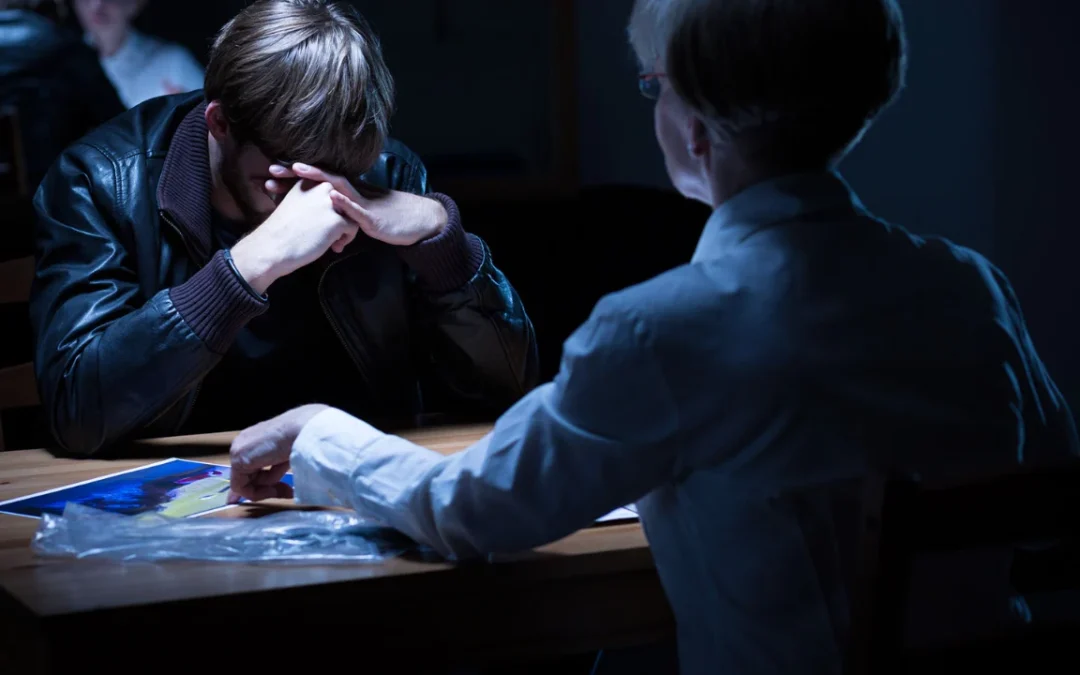Before diving into the details of Navigating Police Questioning in Part 2, check out Part 1 to build a solid foundation on your legal rights and protections.
There are several additional rules and procedures that the police are required to follow when questioning a suspect. This guide will provide an overview of an individual’s rights when under arrest and will outline the procedures Victoria police must follow during questioning.
Interview Procedures
If you have been arrested by police and are awaiting an interview, you do not have to answer any questions. You only have to tell the police your name and address (per section 456AAA Crimes Act).
Then, once the police have commenced the interview, they must inform you of your rights. This includes:
- Informing you of the circumstances of the alleged offence in sufficient detail to enable you to understand questioning and make decisions about your legal rights (per section 464A(2)(a)).
- Informing you of your right to remain silent (section 464J)
- Informing you that you have the right to communicate with a lawyer, or friend or relative (per section 464C). The only exception to this is if the police believe on reasonable grounds that communication would result in the escape of an accomplice.
- Informing you that you have a right to an interpreter (if you do not speak sufficient English) (per section 464D);
- Informing you that you have the right to communicate with a consular office (if you are a non-citizen) (per section 464F)
Recording of the Interview
Victoria police must also follow several procedures regarding the recording of interviews. These include:
- If practicable, police must tape, or video record the conversation in which they advise the suspect of their legal rights and any responses (per section 464G).
- Any confessions or admission (section 464H).
- If the suspect has made any confessions or admissions before questioning commences, then the police must confirm the substance of the confession/admission on record (section 464H(1)(c)).
- If a confession or admission is made during questioning where interview facilities were available, it must have been recorded by audio/visual (section 464H(1)(d)).
- Where interview facilities are unavailable, the substance of the confession/admission must be confirmed with the suspect, with that confirmation being recorded (s464H(1)(e))
Remaining in Custody for a Reasonable Time
In addition to the above, a person in custody, having been arrested or being in the company of an investigating official for the purpose of questioning or investigation must be either released unconditionally or on bail, or brought before a bail justice within a reasonable time (section 464A(1)). There are many factors to consider when determining what amount of time in custody is ‘reasonable’. These are outlined in section 464A(4), and include:
- Time reasonably required to bring D before a bail justice or the Magistrates’ Court
- Number and complexity of offences
- Time required for police to prepare for questioning
- Any need to transport the person from the place of apprehension to a place where facilitates are available to conduct an interview
- Number of people to be questioned
- Any need to visit the place where the offence is believed to have been committed, or any other place reasonably connected with the investigation
- Any time taken to communicate with a legal practitioner, friend, relative, parent, guardian or independent person
- Any time taken by the above-mentioned people to arrive at the place of questioning
- Any time during which questioning is delayed allowing D to received medical attention
- Any time during which the person is allowed to rest
- Total period of time during which the person has been in the company of the investigating official (both before and after custody)
- Any other matters reasonably connected with the investigation of the offence
So, taking this into consideration, police must act quickly once a person has been brought into custody. If they do not, then they may be in breach of their legal obligations under the Crimes Act.
Police Powers Regarding Fingerprints
There are specific laws that authorise police to obtain a suspect’s fingerprints. Under section 464K(1) A police officer may take an adult’s fingerprints if they have reasonable grounds for believing that they committed an offence, or they have been charged/summonsed for an indictable or summary offence. They must be informed of the purpose of obtaining fingerprints and the offence they have been charged with. They also must be informed that the fingerprints may be used in evidence in court (section 464K(2)(a-b). They also must be informed that if they are not charged with a relevant offence within 6 months and are not found guilty of an offence within that period, the fingerprints will be destroyed (section 464(2)(e)).
Fingerprinting Minors
These same rules apply for persons under 15-17 years of age, however, a parent, guardian or independent person must be present for the giving of information about taking fingerprints and the actual taking of fingerprints (section 464K(8)(a)). Children aged 10-14 years of age can have their fingerprints taken if it is believed on reasonable grounds that they have committed, or been charged with an indictable or summary offence (section 464L(2)). Children aged 10 years old and younger cannot be fingerprinted (section 464L(1)).
How Galbally Parker Lawyers can Help with Police Questioning
Knowing your legal rights when interacting with the police is vital for safeguarding yourself and ensuring equitable treatment. Although this guide offers a strong foundation, it’s important to recognise that every situation is unique, and the intricacies of the law can be difficult to manage on your own.
If you are approached, questioned, detained, or arrested by the police, we highly recommend contacting a criminal defence lawyer right away. An experienced attorney can offer the expert advice and representation necessary to protect your rights and strive for the best possible outcome. At Galbally Parker, we are here for you. We assist clients across Melbourne with their criminal matters, including Frankston, Moorabbin, Werribee and Dandenong.


